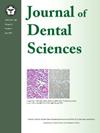缺氧增强了丁香碱诱导的口腔鳞状细胞癌的侵袭和转移——TGF-β1信号传导和胶原蛋白生成的研究
IF 3.4
3区 医学
Q1 DENTISTRY, ORAL SURGERY & MEDICINE
引用次数: 0
摘要
背景/目的咀嚼槟榔液是口腔鳞状细胞癌(OSCC)的主要危险因素,主要是由于槟榔碱,一种关键的生物碱。在肿瘤微环境中常见的缺氧也会影响癌症的进展。本研究探讨槟榔碱与缺氧联合作用对舌鳞癌(SCC-25)细胞增殖、迁移及蛋白表达的影响,重点研究TGF-β1信号通路与I型胶原蛋白的产生。材料与方法用槟榔碱处理scc -25细胞,在常氧或缺氧条件下培养24 h。细胞毒性试验和Western blotting检测细胞活力和蛋白表达。结果在常氧条件下,槟榔碱浓度为2.5 μg/mL,可促进SCC-25细胞的增殖,而低氧条件下则抑制这种作用。槟榔碱显著促进细胞迁移,缺氧进一步放大。Western blotting显示槟榔碱上调TGF-β1、Smad2/3、磷酸化Smad2/3和I型胶原。缺氧条件下,HIF1-α的表达随着TGF-β1和I型胶原蛋白的升高而升高,说明缺氧通过TGF-β1信号通路促进槟油碱诱导的胶原蛋白的生成。结论槟榔碱可刺激SCC-25细胞增殖和迁移,缺氧可通过促进TGF-β1信号传导和I型胶原的生成来放大这一作用。这些结果表明,槟榔饮伴缺氧可能加剧OSCC的侵袭和转移。本文章由计算机程序翻译,如有差异,请以英文原文为准。
Hypoxia amplifies arecoline-induced invasion and metastasis in oral squamous cell carcinoma – Insights into TGF-β1 signaling and collagen production
Background/Purpose
Betel quid chewing is a major risk factor for oral squamous cell carcinoma (OSCC), largely due to arecoline, a key alkaloid. Hypoxia, common in the tumor microenvironment, also influences cancer progression. This study investigated the combined effects of arecoline and hypoxia on proliferation, migration, and protein expression in tongue squamous cell carcinoma (SCC-25) cells, focusing on the TGF-β1 signaling pathway and type I collagen production.
Materials and methods
SCC-25 cells were treated with arecoline and incubated for 24 h under normoxia or hypoxia. Cytotoxicity assays and Western blotting were performed to assess cell viability and protein expression.
Results
At 2.5 μg/mL, arecoline enhanced SCC-25 cell proliferation under normoxia, while hypoxia suppressed this effect. Arecoline significantly promoted cell migration that was further amplified by hypoxia. Western blotting revealed that arecoline upregulated TGF-β1, Smad2/3, phosphorylated Smad2/3, and type I collagen. Under hypoxia, HIF1-α expression increased along with TGF-β1 and type I collagen, indicating that hypoxia enhances arecoline-induced collagen production through TGF-β1 signaling.
Conclusion
Arecoline stimulates SCC-25 cell proliferation and migration, with hypoxia amplifying these effects by promoting TGF-β1 signaling and type I collagen production. These findings suggest that betel quid consumption, in combination with hypoxia, may exacerbate the invasion and metastasis of OSCC.
求助全文
通过发布文献求助,成功后即可免费获取论文全文。
去求助
来源期刊

Journal of Dental Sciences
医学-牙科与口腔外科
CiteScore
5.10
自引率
14.30%
发文量
348
审稿时长
6 days
期刊介绍:
he Journal of Dental Sciences (JDS), published quarterly, is the official and open access publication of the Association for Dental Sciences of the Republic of China (ADS-ROC). The precedent journal of the JDS is the Chinese Dental Journal (CDJ) which had already been covered by MEDLINE in 1988. As the CDJ continued to prove its importance in the region, the ADS-ROC decided to move to the international community by publishing an English journal. Hence, the birth of the JDS in 2006. The JDS is indexed in the SCI Expanded since 2008. It is also indexed in Scopus, and EMCare, ScienceDirect, SIIC Data Bases.
The topics covered by the JDS include all fields of basic and clinical dentistry. Some manuscripts focusing on the study of certain endemic diseases such as dental caries and periodontal diseases in particular regions of any country as well as oral pre-cancers, oral cancers, and oral submucous fibrosis related to betel nut chewing habit are also considered for publication. Besides, the JDS also publishes articles about the efficacy of a new treatment modality on oral verrucous hyperplasia or early oral squamous cell carcinoma.
 求助内容:
求助内容: 应助结果提醒方式:
应助结果提醒方式:


